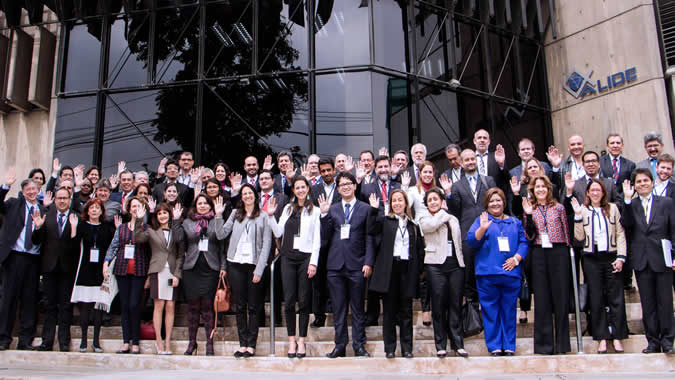Financial Inclusion of SMEs is Fundamental for their Productive Insertion
Work area(s)
ECLAC and ALIDE held a seminar in Peru on promoting development bank financial innovation policies on this issue.

In the last three decades the financial sector has grown significantly, especially in Latin America and the Caribbean, where it has expanded about 18% on average. According to ECLAC, this growth necessitates the design and construction of an inclusive financial system dedicated to productive financing, which is particularly relevant to the region’s Small and Medium-sized Enterprises (SMEs).
The financial inclusion of SMEs, and the innovation policies that regional development banks can apply in this area, were the subject of a seminar held on August 16-17 in Lima, Peru, organized by the Economic Commission for Latin America and the Caribbean (ECLAC) and the Latin American Association of Development Financing Institutions (ALIDE).
At the gathering, senior executives from development banks, government officials and experts on financial inclusion from various countries in the region exchanged experiences with the goal of garnering lessons and recommendations on economic and financial policy.
According to the experts from ECLAC’s Economic Development Division who participated in the seminar, financial inclusion should be conceived of as a policy for productive insertion. This inclusion entails providing access to formal financial services to those lacking them, and perfecting the system for those who are already part of the formal financial circuit. This is fundamental for the productive insertion of SMEs, since it expands the range of saving and consumption possibilities for the general public and improves these enterprises’ harnessing of entrepreneurial talents and their investment opportunities.
During the seminar, participants were introduced to ECLAC’s project on “Financial Inclusion of SMEs and Development Bank Financial Innovation Policies,” the goal of which is to identify and promote the elaboration of a broad set of financial instruments that enable development banks to boost the financial inclusion of SMEs, since they play a central role in the productive matrix and in job creation. The research is centered on the experience of seven countries in the region: Argentina, Brazil, Colombia, Costa Rica, Ecuador, Mexico and Peru.
By carrying out national studies and a regional study, the project seeks to evaluate the state of SMEs’ financial inclusion through indicators that measure its basic aspects. According to ECLAC, financial inclusion is a pending matter in Latin America and the Caribbean since the vast majority of SMEs have low levels of access to the formal financial system (just 45% of them have access to credit from financial institutions). According to the organization, improving SMEs’ financial inclusion means establishing spaces for the creation of markets and new instruments that should be designed as “public goods.”
In addition, beyond the creation of new instruments, development banks have a role to play in promoting innovation in financial processes. Through direct, personalized and continuous contact, they can better evaluate SMEs’ payment capacity, help reduce information asymmetries and facilitate monitoring, the study adds. In addition, there is an institutional dimension that must be considered since development banks in Latin America and the Caribbean have different models and can be the object of coordination at a national level and of complementarity with private banks, all of this in the context of regulatory frameworks that favor innovation.
The country studies in the project that ECLAC is carrying out were presented in national workshops in Colombia, Mexico and Ecuador (in 2016) and at a regional workshop held in Mexico this year (2017). At the same time, they will serve as the basis for a regional study that will be released at a regional seminar to be held in Santiago, Chile in October 2017.
As the project nears its conclusion, it is expected to provide orientation on the strengthening of public financial policies to promote SMEs’ financial inclusion as well as to introduce improvements in development banks’ financial instruments aimed at mobilizing resources for productive development.
More information on the ECLAC-ALIDE seminar held in Lima is available on ECLAC’s website.
To find out more about ECLAC’s project on the financial inclusion of SMEs, also visit this site.
Related content

Peru: Latin American and Caribbean seminar promoting financial inclusion though development bank financial innovation policies
ECLAC and the Latin American Association of Development Financing Institutions (ALIDE) are co-organizing a seminar to promote financial inclusion of SMEs through development bank financial innovation…
Related event

Peru: Latin American and Caribbean seminar promoting financial inclusion though development bank financial innovation policies
ECLAC and the Latin American Association of Development Financing Institutions (ALIDE) are co-organizing a seminar to promote financial inclusion of SMEs through development bank financial innovation…
Related project(s)
Contact
Public Information Unit
- prensa@cepal.org
- (56 2) 2210 2040
